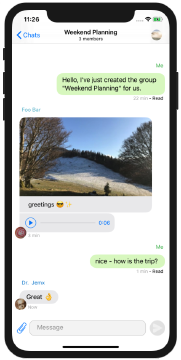Out of all front–ends for
Mastodon/Pleroma the one
with the funniest name is Soapbox
(repo). Social media is a

Another wandering soul whispering into the void. If you are looking for my blog you are in the wrong place. The profile and header pictures are brought to you by cdd20.

Another wandering soul whispering into the void. If you are looking for my blog you are in the wrong place. The profile and header pictures are brought to you by cdd20.
‘One thing well’ is alive again. cbformat looks extremely useful — might just beat my current method of formatting code blocks in Markdown.

Another wandering soul whispering into the void. If you are looking for my blog you are in the wrong place. The profile and header pictures are brought to you by cdd20.
Blade CLI is a nice find. I saw a past iteration of this a while back in nsrosenqvist/blade-cli. Basically, it’s a for kinda rendering blade templates. Don’t ask why…
name: {{ $name }}
type: {{ $type }}blade render data.yaml --name="name" --type="type"
Another wandering soul whispering into the void. If you are looking for my blog you are in the wrong place. The profile and header pictures are brought to you by cdd20.
The Syncthing developers have added
support for synchronizing
ownership and
extended attributes.
If enabled, root might be needed and the bidirectional sensitivity/conditions for
file conflicts might increase dramatically. From perusing the
commits, versions after
1.22.1 should stabilize these features.

Another wandering soul whispering into the void. If you are looking for my blog you are in the wrong place. The profile and header pictures are brought to you by cdd20.
Sometimes the source code is the ultimate documentation. If you’re creating color schemes based on chroma, nothing beats types.go for finding out what each token means.

Another wandering soul whispering into the void. If you are looking for my blog you are in the wrong place. The profile and header pictures are brought to you by cdd20.
cgit is good. I’ve added
a small note
on using git maintenance with
cgit.

Another wandering soul whispering into the void. If you are looking for my blog you are in the wrong place. The profile and header pictures are brought to you by cdd20.
Kiwi Browser (download) is a Chromium
derivative on Android that can directly expose the built–in dev tools on device.
Remote debugging
is my preference, but it makes quick


Another wandering soul whispering into the void. If you are looking for my blog you are in the wrong place. The profile and header pictures are brought to you by cdd20.
Larnyx/Rhasspy is an excellent/fast offline text to speech program. There’s approximately 50 voice samples.
It would be trivial to turn this into an that reads articles/posts, but it’s on Python so packaging it “directly” (there’s a docker container) is way harder than actually using it.

Another wandering soul whispering into the void. If you are looking for my blog you are in the wrong place. The profile and header pictures are brought to you by cdd20.
Delta Chat is the premier waiting room to be in until the big boys end their chat app/protocol wars. What does it do? It turns your email into a full blown chat application. Yes… it’s an email messenger.
I was finally able to smoothly convert my last Signal
contact. To persuade others, first prioritize email communication —
ruthlessly. Then say: “Who in the world wants 10+ chat apps to talk to
everyone?” If there’s agreement — you win ;-)
Supports: iOS macOS Windows Linux

Index: Cache · Source

Another wandering soul whispering into the void. If you are looking for my blog you are in the wrong place. The profile and header pictures are brought to you by cdd20.
HTML Sucks Completely (HSC) is a fitting name for what might be one of the first of many static site generators (SSG).